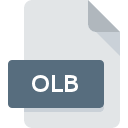.OLB File Extension

OLE Object Library
| Developer | Microsoft |
| Popularity | |
| Category | Misc Files |
| Format | .OLB |
| Cross Platform | Update Soon |
What is an OLB file?
The .OLB (OLE Object Library) file extension is primarily associated with Object Linking and Embedding (OLE) technology in Microsoft Windows operating systems. OLE facilitates the embedding and linking of documents and objects within documents or applications.
More Information.
.OLB files were developed to store collections of reusable software components, such as controls, interfaces, or libraries, that could be easily integrated into various applications. These files served as repositories for developers to access pre-built functionalities and accelerate software development.
Origin Of This File.
The .OLB file format originated alongside the development of OLE technology, which was introduced by Microsoft in the early 1990s.
File Structure Technical Specification.
.OLB files typically contain binary data representing the compiled code and metadata necessary for the integration of software components. The internal structure may vary depending on the specific content and purpose of the library.
How to Convert the File?
Windows: Converting .OLB files in Windows typically involves using development environments like Microsoft Visual Studio. Developers can import .OLB files into their projects and utilize the contained components directly. Third-party conversion tools may be available for converting .OLB files to alternative formats if needed.
Linux: Converting .OLB files on Linux systems can be challenging due to limited native support. However, developers may explore using Wine, a compatibility layer that allows running Windows applications on Linux, to access .OLB files within compatible development environments. Cross-compilation techniques or manual porting may be necessary to adapt .OLB components for Linux-based projects.
macOS: macOS does not natively support .OLB files, but developers can leverage emulation or virtualization software like Parallels Desktop or Wine to run Windows-based development environments. Once accessible, developers can integrate .OLB components into their macOS projects or explore conversion options tailored to macOS development frameworks.
Android: Converting .OLB files for use in Android applications requires adapting the components for compatibility with Android development environments. Developers can utilize cross-platform development frameworks like Xamarin or Apache Cordova to integrate .OLB components into Android projects. Manual conversion of the components to compatible formats supported by Android, such as Java or Kotlin, may be necessary.
iOS: Converting .OLB files for iOS development involves adapting the components for use within Xcode, the primary development environment for iOS applications. Developers may need to rewrite or port the components to programming languages supported by iOS, such as Objective-C or Swift. Cross-platform development frameworks like Xamarin or React Native can facilitate integrating .OLB components into iOS projects.
Others: Converting .OLB files for other platforms may require custom solutions tailored to the specific platform’s development environment and requirements. Developers may need to explore cross-compilation techniques, manual porting, or utilizing compatibility layers and virtualization software to integrate .OLB components into non-standard environments. Third-party conversion tools or development frameworks may offer support for alternative platforms, depending on their compatibility and ecosystem.
Advantages And Disadvantages.
Advantages:
- Facilitates code reusability and modular software design.
- Streamlines development by providing access to pre-built components.
- Promotes consistency and standardization across applications.
Disadvantages:
- Dependency management can become complex, leading to versioning issues.
- Increased file size due to the inclusion of compiled code.
- Limited compatibility outside of the Windows ecosystem.
How to Open OLB?
Open In Windows
.OLB files can be opened in Windows using compatible development environments or software tools such as Microsoft Visual Studio.
Open In Linux
While .OLB files are primarily associated with Windows, some development environments on Linux, such as Wine, may provide limited support for opening or accessing these files.
Open In MAC
macOS does not natively support .OLB files, but compatibility may be achieved through emulation or virtualization software like Parallels Desktop or Wine.
Open In Android
Android operating systems do not support .OLB files directly. However, developers may be able to integrate .OLB components into Android applications using cross-platform development frameworks or by porting the components to compatible formats.
Open In IOS
iOS does not support .OLB files natively. Developers targeting iOS platforms would need to adapt .OLB components for use within iOS applications or explore alternative solutions.
Open in Others
Outside of the mentioned operating systems, opening .OLB files may require specialized software tools, development environments, or custom integration solutions tailored to the specific platform requirements.











